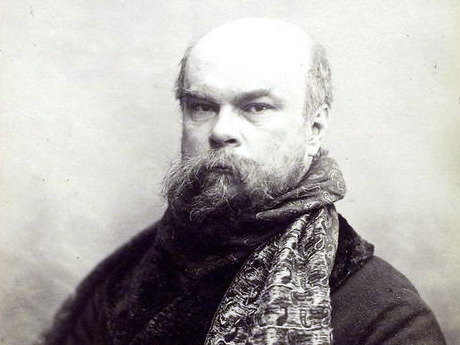Tributes
Verlaine, Afterwards

Paul Verlaine, his genius taking refuge in the future, remains a hero.
—Stephané Mallarmé
Poetry is the afterlife of poems. Trailing wisps of glory and mishap, squalor and proprioception, they evanesce into the next utterance and the next, into circumstances not only beyond their control but, happily, beyond their first imagination. Thus in a swirling Parisian snow, on January 10, 1896, Mallarme, delivering his funeral oration for Paul Verlaine, looked to the future of his late friend's poems and saw their genius safely sheltered in words yet to be written and in the company of writers yet to be born. Verlaine had always been ahead of his time. And by that I do not mean to characterize his genius as either prophetic or wildly innovative. He was a poet of the near—the nearest love, the nearest glass, the nearest glimmer of salvation. And his music is so simple, his rhymes and rhythms so perfectly undisguised, that it seems to sound from some arcadian moment, long before the invention of writing or perhaps long after the final book has blown to ash. Verlaine was simply the forerunner of himself, a poet who had given his heart away in pursuit of his heart.
De la musique avant toute chose...("The Art of Poetry")
Love sounds the music given, already and always just ahead. A poem is the first and following trace of the sound. And so it is that Verlaine seems purely a surrounding, sometimes called "Verlaine," disappearing and durable. In "Song of Myself," Walt Whitman opined "If you want me again, look for me under your boot-soles." He meant to become grass, disappearing beneath the traveler's feet even as it stretches towards horizon. In "Tombeau de Paul Verlaine," written January 10, 1897, Mallarme proposes the same for his departed master-friend:
Verlaine? Il est caché parmi l'herbe, Verlaine...
What is the grass? It is a green thing hidden "parmi," among itself. The aftermath of Verlaine is Verlaine by other names, continuing. Resting inseparable from horizon, the poems speed and spread.
How shall we keep pace with Paul Verlaine? In poems, surely, careful always to be careless with desire, as was he, lest the nearest love become the last and lest salvation settle into a threadbare paradise of ease. In "The Poet," Whitman's sage and reluctant advocate, Emerson, declared that "Language is fossil poetry." Keeping pace with Verlaine, we carry that declaration forward. Poetry is the afterlife of poems—a curio, a roadside chapel, an ossuary—unless another poem comes along, one as unsettled and unsettling as all the best before. The loving imperfections trust to luck, to a green horizon of haphazard.
Et tout le reste est littérature...("The Art of Poetry")
The unsure egoist is true to himself in glimmers and in flecks of time. True hedonism is tireless. Verlaine had no time for literature. He was too much in love with the poem at hand to trouble with judgment and meek adjustments. Even his darkness hurries beside his death, as profligate as daylight. The next poem cannot fail. One hundred years and more beyond Mallarme's original elegy comes another Tombeau de Paul Verlaine, by Yves Bonnefoy, France's greatest living poet, and from it strides an exclamation, accomplice to Verlaine's escape.
Juges, au soir, les mots!
In the evening, words are judges; but as to their justice, it's far too late to tell. And never mind. Daylight has escaped with the music of poems—"De la musique avant toute chose"—evanesced beyond control. Literature remains behind.
Where is Verlaine now? The question answers itself in its final word. And Verlaine was happy to say so, knowing that poems are made from poems that come after.
Maintenant, au gouffre de Bonheur!
The "abyss of happiness" images dimensionless refuge, its genius keeping time. Verlaine gave his heart away to happiness. The abyss will never fail him now.
* * *
WORKS CITED
Yves Bonnefoy. Second Simplicity: New Poetry & Prose, 1991-2011 (trans. Hoyt Rogers). New Haven & London: Yale University Press, 2011.
Stephane Mallarme. Divagations (trans. Barbara Johnson). Cambridge, MA & London: The Belknap Press of Harvard University Press, 2007.


